
CAR T Cells Show Promise Against Age-Related Diseases in Mice
Laboratory research led by MSK and Cold Spring Harbor Laboratory demonstrates the potential for CAR T cells to improve “healthspan” by eliminating senescent cells associated with aging-related diseases.
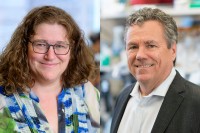
Expansion of Cell-to-Cell Communication Drives the Early Development of Pancreatic Cancer, New Research in Mice Finds
New MSK research combined sophisticated genetically engineered mouse models and advanced computational methods to map the earliest cell states leading to pancreatic ductal adenocarcinoma (PDAC), the most common type of pancreatic cancer.
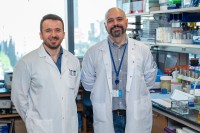
New MACHETE Technique Slices Into Cancer Genome To Study Copy Number Alterations
Learn why MSK researchers developed MACHETE, a new CRISPR-based technique to study large-scale genetic deletions efficiently in laboratory models.
In the Lab
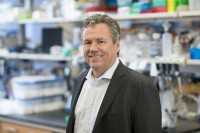
SKI Scientists Solve 30-Year-Old Mystery About p53 Protein — Dubbed ‘Guardian of the Genome’
Rather than promoting genetic chaos, loss of p53 leads to an orderly progression of genetic changes that no one saw coming.
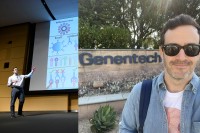
Training the Next Generation of Scientists: Meet 3 Remarkable MSK Alumni
At MSK, our goal is not just to train the scientists of tomorrow, but the scientific leaders.

Sloan Kettering Institute Scientists Learn How Genes and Environment Conspire in Pancreatic Cancer Development
The insights lay the groundwork for earlier diagnosis and better treatment of the disease.
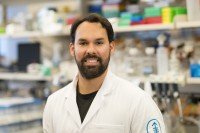
Confronting a Crisis: How MSK Cancer Geneticists Responded to COVID-19
During World War II, US factories famously converted their operations to support the war effort. COVID-19 instigated something similar among cancer scientists.
In the Lab
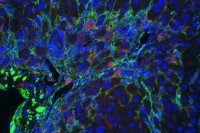
A New Target for CAR T Cells: Senescence-Related Diseases
From atherosclerosis and diabetes to liver fibrosis and osteoarthritis, senescent cells are at the root of many debilitating diseases. Scientists increasingly have them in the crosshairs.
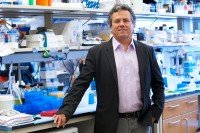
At Work: Cancer Biology and Genetics Program Chair Scott Lowe
Biologist Scott W. Lowe is an expert on the processes that naturally inhibit cancer development.
In the Lab
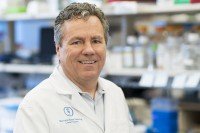
Drug Combination Could Boost the Effectiveness of Immunotherapy against Pancreatic Cancer
Studies conducted in mice reveal a potential way to breach the defenses of pancreatic cancer tumors.
In the Lab
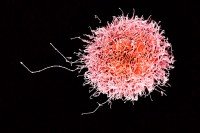
Drugs That Stall — But Don’t Kill — Cancer Cells Are an Untapped Resource, Study Suggests
A drug combination that halts tumor cell division can stir the immune system into taking action.
In Brief

Scientists Identify How Gene Mutation Drives a Deadly Childhood Cancer
Synovial sarcoma is an aggressive cancer primarily affecting children and young adults. A new study gets to the bottom of it.
In the Lab
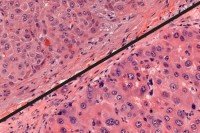
With Help of CRISPR, Scientists Unravel the Cause of a Rare Liver Cancer
A team led by MSK molecular biologist Scott Lowe is making progress against fibrolamellar hepatocellular carcinoma.
In the Lab
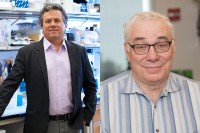
Knocking Out KRAS-Mutant Cancers with a One-Two Punch
A new approach aims to combine two existing targeted therapy drugs to attack lung cancer and pancreatic cancer with mutations in the hard-to-target gene KRAS.
Feature
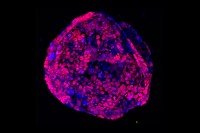
Three Compelling Cancer Advances from 2015
MSK researchers moved cancer science ahead in 2015 with landmark discoveries that suggest new treatment strategies and shed light on how the disease progresses.
In the Lab
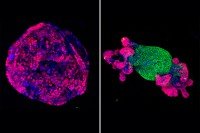
Manipulating a Single Gene Turns Colorectal Cancer Cells Back to Normal
For the first time, scientists have shown that the gene APC, which is mutated in the vast majority of colorectal cancers, might be a promising target for future therapies.
Finding
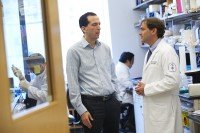
Study Reveals How Some Breast Cancers Become Resistant to Targeted Drugs
A study of one patient’s disease has clarified why tumors stop responding to a class of experimental drugs called PI3K inhibitors.
In the Lab

Researchers Uncover Potential Target for “Undruggable” Form of Liver Cancer
In taking a new approach to finding treatments for hepatocellular carcinoma, MSK scientists have uncovered a potential drug target for this highly aggressive cancer.
Decoder

What Is Tumor Heterogeneity?
Understanding tumor heterogeneity may be the next big quest in cancer science, as differences between cells within a tumor can have important consequences for how cancers are diagnosed and treated.
Announcement

Memorial Sloan Kettering Featured Prominently at Major Cancer Research Meeting
Discoveries made at Memorial Sloan Kettering receive recognition at the 2014 Annual Meeting of the American Association for Cancer Research.
Signs of Aging, Even in the Embryo
Biologist Scott Lowe commented on new research that found senescent cells – cells that stop dividing over time – in embryos....
In the Lab

Gene Mutation Linked to Inherited Risk of Common Form of Childhood Leukemia
Researchers have found the first evidence that susceptibility to developing acute lymphoblastic leukemia during childhood may be heritable.
Video

A Look Inside the Geoffrey Beene Cancer Research Center
Watch our scientists discuss how the Geoffrey Beene Center helped Memorial Sloan Kettering establish a progressive approach to modern cancer research.
Announcement
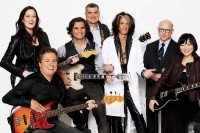
Geoffrey Beene Rock Stars of Science™ Campaign Features Memorial Sloan Kettering Researchers
The initiative, focused on investigators from Memorial Sloan Kettering’s Geoffrey Beene Cancer Research Center, highlights the critical need for funding scientific research.
Q&A

At Work: Biologist Scott Lowe, Chair of the Geoffrey Beene Cancer Research Center
In the lab of cancer biologist Scott Lowe, researchers are investigating the processes that naturally inhibit cancer development.

Biologist Scott Lowe Joins Memorial Sloan Kettering
Scott W. Lowe has joined Memorial Sloan Kettering Cancer Center as a member of the Cancer Biology and Genetics Program in the Sloan Kettering Institute and Chair of the Geoffrey Beene Cancer Research Center.

























